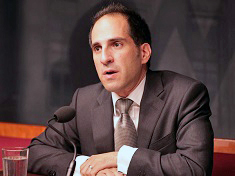-
Providing for the Periphery: Anthony Speca on Development for Canada’s Resource-Rich Nunavut
August 7, 2015 By Carley Chavara Rich in natural resources, poor in nearly every human development indicator. The description applies to many of the most-conflict ridden states in the world, but also to a region often forgotten in global development circles: the Arctic North.
Rich in natural resources, poor in nearly every human development indicator. The description applies to many of the most-conflict ridden states in the world, but also to a region often forgotten in global development circles: the Arctic North.Rich in natural resources, poor in nearly every human development indicator. The description applies to many of the most-conflict ridden states in the world, but also to a region often forgotten in global development circles: the Arctic North.
At some point above the 66th parallel, the North-South divide does a 180, says Anthony Speca, managing principal for the consulting firm Polar Aspect, in this week’s podcast. Although Canada ranks in the top 10 of the Human Development Index (HDI), a subnational study reveals dramatic inequalities, placing the northeastern territory of Nunavut on par with Palestine or Paraguay.
“Nunavut is basically blessed with virtually everything you could think of to dig out of the ground: iron, zinc, copper, silver, gold, diamonds, oil, gas uranium, sapphires. You name it, you can probably find it,” Speca says. “But all of this natural capital is stranded because there is no infrastructure.”
“What I would like to do, instead of talking about practical policy prescriptions, is make a plea for a change of mindset about the North,” he says. “There is a moral dimension to the question of human security and development in the Arctic that cannot be addressed simply within an economist’s sort of technical solution.”
Resource Restraints
Nunavut makes up 20 percent of Canada at more than 2 million square kilometers, or three times as big as Texas. Eighty-five percent of the 35,000 Canadians who live there are Inuit, a people who have long been at the mercy of larger powers.
“Communities were instantaneously impoverished”The Inuit were forced to form permanent settlements and adjust their nomadic livelihoods in the mid-20th century to make it easier for the government to provide public services, says Speca. Then in the 1980s, they were devastated by international bans on seal imports.
“Whereas… a single seal pelt could pay for a day’s worth of hunting before 1983, after the ban in 1983, a single seal pelt wouldn’t even buy a box of bullets,” says Speca. “Sixty percent of the income of Inuit communities was, overnight, wiped out. Vanished. These communities were instantaneously impoverished.”
He relates this experience to the present debate on banning offshore drilling. “Not to say that people in the Arctic want to see a forest of oil derricks off their shores,” says Speca, “people in the Arctic are conflicted about the benefits of oil and gas development and they are fully aware of the possible consequences. It’s just that they want to be the ones to decide how to balance that question, not have it decided by southern interests – again in a way that treats their communities as collateral damage in a greater fight for something else.”
More Than Markets
“If Nunavut is ever going to achieve the levels of human security and human development it deserves, it’s going to have to start first with government,” says Speca. “You are not going to get human development in Nunavut simply by relying on market forces.”
The costs of doing business in Nunavut are high, says Speca. Roads and airports are scarce and of bad quality, commercial leasing rates are high, and internet speeds are slow. “The private sector depends on the government to have already provided a certain base of infrastructure,” he says, “and the government is simply not doing that.”
“These sorts of social outcomes would not be tolerated in southern Canada”Canada’s Territorial Finance Formula in theory fills the gap between the territory’s expenditure needs and revenue generation, but the funding Nunavut receives does not compare with that of the South, Speca says. “I wouldn’t even call it ‘expenditure need’ I would just call it what the federal government is willing to see go out the door.”
“Pick any social indicator you can think of,” he says, “all of these are much, much, much worse than they are in southern Canada.” The suicide rate is 10 times higher. One-third of Nunavummiut are food insecure, 50 percent rely on social assistance, and 50 percent live in public housing. Demographic instabilities contribute to these vulnerabilities as one-third of the population is under 15 years old and the birthrate remains higher than in the South at over three children per woman. “These sorts of social outcomes would not be tolerated in southern Canada,” Speca says.
“I don’t think we are going to go anywhere unless…the government stops thinking of the North as a national space where they have local agents – namely the territorial governments to deliver public services as cheap as possible – and rather, instead thinks of it as an integral part of Canada where citizens deserve comparable services at comparable levels of taxation,” he says.
“We have to listen to the people in the Arctic – how they want their development to happen. We have to stop putting obstacles in their way.”
Anthony Speca spoke at a Polar Initiative event at the Wilson Center on July 28.
Friday Podcasts are also available for download on iTunes.
Sources: Center for the Study of Living Standards, Department of Finance Canada, United Nations Development Program.
 A Publication of the Stimson Center.
A Publication of the Stimson Center.

 Rich in natural resources, poor in nearly every human development indicator. The description applies to
Rich in natural resources, poor in nearly every human development indicator. The description applies to 

